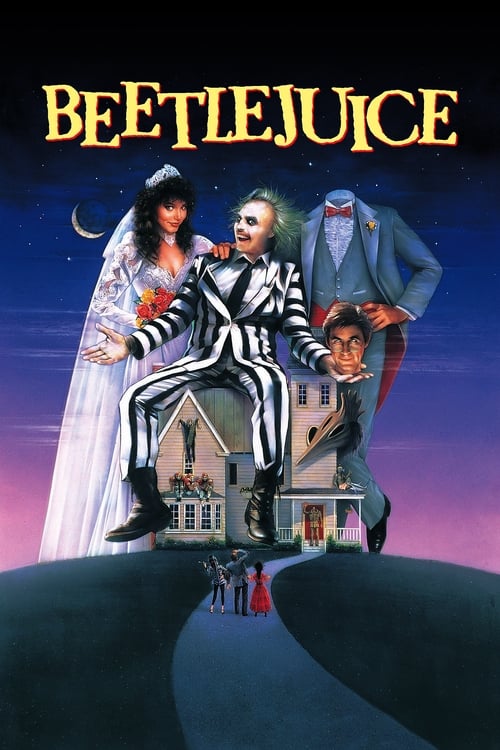
Title: Beetlejuice
Year: 1988
Director: Tim Burton
Writer: Michael McDowell
Cast: Alec Baldwin (Adam),
Geena Davis (Barbara),
Winona Ryder (Lydia),
Catherine O'Hara (Delia),
Jeffrey Jones (Charles),
Runtime: 92 min.
Synopsis: A newly dead New England couple seeks help from a deranged demon exorcist to scare an affluent New York family out of their home.
Rating: 7.373/10
Spectral Whimsy: Tim Burton’s Beetlejuice as a Dance of the Macabre
/10
Posted on July 12, 2025
Tim Burton’s Beetlejuice (1988) is a gleeful plunge into the absurd, a film that revels in its own eccentricity while anchoring its chaos in a surprisingly tender human core. Burton’s direction is the film’s heartbeat, transforming a potentially gimmicky ghost story into a visually audacious exploration of life, death, and bureaucratic limbo. His signature gothic whimsy evident in the warped, handcrafted sets and stop-motion flourishes creates a netherworld that feels both alien and oddly intimate, like a funhouse mirror reflecting the mundane anxieties of suburbia. The Deetz house, with its clashing modernist decor and spectral inhabitants, becomes a character in itself, embodying the tension between the living and the dead, the kitsch and the profound.
Michael Keaton’s Beetlejuice is a revelation, a performance so unhinged yet precise that it threatens to eclipse the film’s quieter strengths. His rapid-fire delivery and grotesque charisma make the titular ghost a chaotic force of nature, but Keaton’s restraint in key moments his sly glances, his fleeting vulnerability hints at a deeper pathos beneath the grime. Winona Ryder’s Lydia Deetz, meanwhile, offers a counterpoint: her melancholic, proto-goth sincerity grounds the film’s zaniness, making her connection with the ghostly Maitlands (Alec Baldwin and Geena Davis) unexpectedly moving. Baldwin and Davis, though less flashy, imbue their roles with a warmth that makes the film’s supernatural hijinks feel like a quirky family drama.
The screenplay, penned by Michael McDowell and Warren Skaaren, is both a strength and a minor stumbling block. Its episodic structure captures the anarchic spirit of the afterlife but occasionally sacrifices narrative cohesion for visual gags. The film’s brisk 92-minute runtime, while refreshing, leaves some character arcs particularly those of the Maitlands feeling underdeveloped. Yet this looseness allows Burton’s visual inventiveness to shine, from the surreal waiting room of the dead to the iconic sandworm sequences, all underscored by Danny Elfman’s mischievous score. Elfman’s music, with its playful yet haunting motifs, amplifies the film’s tonal tightrope walk between comedy and existential dread.
Cinematographer Thomas E. Ackerman’s work deserves praise for its bold use of color and shadow, creating a palette that feels both cartoonish and foreboding. The film’s flaws its occasionally uneven pacing and underdeveloped subplots are overshadowed by its fearless originality. Beetlejuice doesn’t just depict the afterlife; it invites us to laugh at its absurdity while quietly pondering our own mortality. It’s a film that lingers, like a ghost you’re not entirely sure you want to exorcise.
0
0
